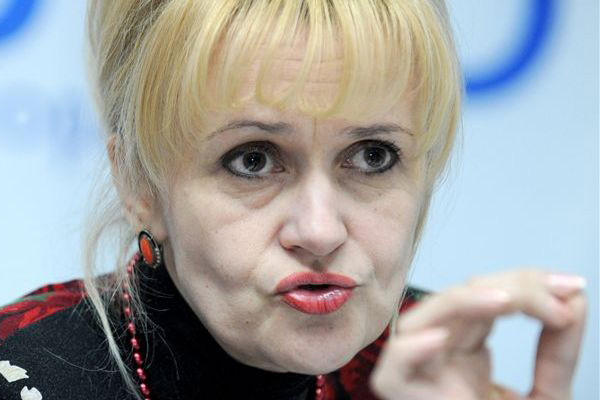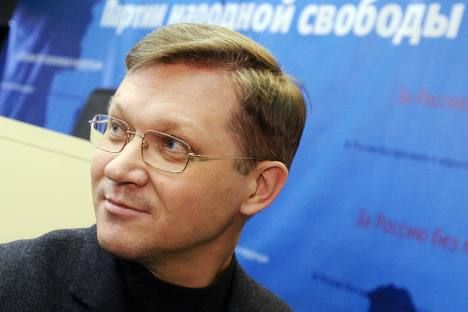Russian President Vladimir Putin agreed with the proposal of the Prime Minister Dmitry Medvedev to dismiss Education Minister Dmitry Livanov.
Dmitry Livanov has repeatedly been criticized for his way of running the reform of education and the reduction of the subsidies by the state places to universities. Thus, according to the documents, which the government approved in the summer of 2016, in 2017-2018 in Russian universities and institutes will be 100 thousand less subsidized places for students than the places paid by students.
Dmitry Livanov was the most unpopular Russian minister. In April 2016 the Russians evaluated his performance by 2.7 points out of 5.
Nevertheless many commentators think that the criticism of Livanov was unfair. The cause of the problems of education in Russia was not bad performance of the minister, but drastic cuts of financing for education introduced by President Vladimir Putin’s government.
Today in Russia there is a vast redistribution of money from education, health, science and culture in favor of the huge military, police and state administration spending.
Over the past 5 years, spending on education in Russia declined rapidly on all budget levels: from regional budgets to federal budget.
The Russian federal budget is the main source of funds for colleges and universities. Over the last 4 years from 2012 to 2016 federal spending on education decreased 36%. And spendings on health care, decreased 50%.
Combined spendings on education from the budgets of all levels decreased cby 15%. During this same 4 year period military spending in Russia has doubled. There is also a rapid increase in police spending and growth of public administration costs.
An average monthly salary of a federal official is about 100 thousand rubles.
An average monthly salary of an official in the country is 35-37 thousand rubles. The lowest level is 20-22 thousand.
School teachers in rural аrеas earn 9-12 thousand rubles a month.
During these 4 years prices in Russia grown 50%-60%. Teachers’ salaries stayed the same. In order to survive teachers take several jobs, keep cows, grow vegetables in their gardens. And they use personal monеy from their miserable wages to make the repair in schools before the school year starts, because the state does not fund these repairs.
Teachers themselves paint the floors in schools. They buy their own manuals and textbooks. The parents buy textbooks for children, because the money for textbooks is not provided by the state.
A huge number of rural households are impoverished. According to official statistics last year 14.4 million of Russians lived below the poverty line. The growth of the poverty was 36.5%. Most of commentators don’t take these figures seriosly as the figures were built on the questionable premise that 10,524 roubles ($162) a month is a sufficient amount of money for the sustenance of an adult. (It’s difficult to judge the cost of living in Russian rural areas. In Moscow, the cost of food appears to be close to American cost.)
State provides schools with 50 rubles (less then $1) a week for food for a child! The average child from a poor family from a rural region goes to school in the morning with an empty stomach and in a school bus on a bumpy. At school, he/she is given a glass of black tea, a slice of black bread, and three tablespoons of semolina porridge on the water. When he /she returns home, there is nothing to eat. There are tens of thousands such children across the country.
Most of this information is taken from an interview given to radio Echo of Moscow by one of the top oposition politicians of Russia, Vladimir Ryzhkov.
In 1997, Ryzhkov (now 49), a historian and a politician from Siberia, was elected Deputy President of the State Duma, becoming the youngest Speaker in its history. Since 2006 Vladimir Ryzhkov has been a co-chair of one of the most influential Russian opposition political parties: Republican Party of Russia – People’s Freedom Party (RPR-PARNAS).
In his interview Ryzhkov stated that 40% of the Russian budget goes to the officials, defense and national security, and only 7.5% is dedicated to education, science, culture, sport and health.
Putin appointed a historian Olga Vasilyeva to the post of the new Education and Science minister. She is a person till now known mostly to specialists.
In 1990, Vasilyeva defended her doctoral thesis on “The Soviet state and patriotic activity of the Russian Orthodox Church during the Great Patriotic War,” which according to her, “was the first work on the subject in the country.”
By now the new Minister has released nearly one hundred articles and books mainly on the interaction of church and state in the Soviet Union.
Olga Vasilyeva is the head of the State-Church Relations Department at the Academy of Public Administration and Management; she is also on the editorial staff for the journal “State, Religion, Church.” Some sources report that she established her initial connection with the government through developing the concept of a modern religious governmental policy.
Prior to her appointment to the ministerial position Vasilyeva worked as the deputy head of the Kremlin’s control of public projects, supervising the activities of public organizations – from NGOs do church.
There is a variety of different rumors about Vasilyeva. Some write that she is a Stalinist, while others consider her to be an Orthodox fanatic. There is also an opinion that today in Russia these seemingly opposite characteristics do not exclude each other. Many commentators suspect that todays tendency of developing imperialistic sentiments combining Stalinism with Russian Orthodox traditions is the main reason of choosing Vasilyeva for the ministerial position.
Immediately after her appointment as the Minister Vasileva told about her main plans: “For me the priority is the teacher. The teacher is a mission, the teacher is our future. Today’s children are our tomorrow’s people.” Also Vasilyeva mentioned her desire to return Russian education to the traditions of XIX century.
Here are some comments to the opointment of Vasilyeva made by Vladimir Ryzhkov in his interview to radio Echo of Moscow:
“These days I have meetings with thousands of people, including hundreds of teachers. Everyone understands what is their real life and what is official state rhetoric… such as when a new Minister says, ‘I’ll take care of the teachers’… They’ve seen a lot of these Ministers, and they know the value of this kind of statements by officials.
“Vasilyeva says: ‘We will revitalize the school of the XIX century.’ Go on, revive the school of the XIX century, where teachers were geting huge salaries, perfect living accomodations, where the teaching profession was one of the most prestigious. Let us revive that.
“If you pay 9.000 rubles a month to a teacher who’s running around from morning till night in school, needs to find time to feed her cow, has to to find and buy three car loads of wood to heat her home in the winter, to get some hay to feed her cow in the winter, needs to plant potatoes, to earth them up, weed and dig them in order not to starve to death… It’s so cynical when they speak from high podiums about the prestige of the teaching profession, the importance of education and then you’re faced with the real situation! This is beyond the absolute cynicism! … It would be better if they stay silent. I have no words.
“And besides, to take the nineteenth century that is 200 year old as a model for a system of education of the twenty-first century? The idea is preposterous! As much as the commitment to Orthodoxy, the commitment to old Russian conservative values.
“Even without these ideas Russia is losing its competitiveness in the world. Russia is lagging behind others in technology, in thoughts, in knowledge, in approach. If we’re going to cultivate in our schools 200-year-old paterns, we will fall behind even more.
“If one does not go forward, one degerates. If one clings to the past, one will end up a failure. Russia is stuck outside time and space today. Due to the impoverishment of the population, due to the economic decline… 350 thousand people had left Russia in the last year. 350 thousand! This is equal to the population of a Russian city.
“Do not go back! Go to future. It’s the only way for Russia’s development.”




I’m not surprised if Dmitry Livanov is using Common Core curriculum
If they keep cutting funding to their schools and treating their teachers even more poorly than they currently are doing, then their country will become a fourth class country educationally and so forth. Tragic, indeed!
So American teachers are not alone in having to supply their classrooms from their own salaries. I thought Russian teachers had better funding.
It would appear our muslim refugees and welfare recipiants live much better than the russian people on average!
This is just Russia as it has always been. The city kids will still get a “good” education. Peasants are just … peasants!!!
Malcontents think the teachers are getting what they deserve ! Education is the best investment made with tax dollars because it pays large dividends!
Propaganda about RUSSIA abounds these days.
So this Russian way of educating is basically the republican way or more specifically Donnie Boi Trump’s way of educating/dumbing down the population